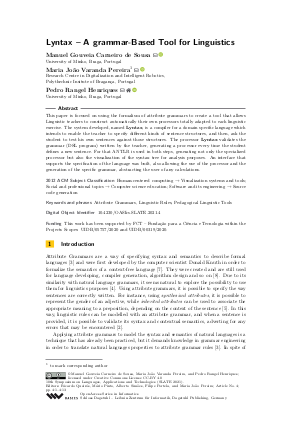Lyntax - A grammar-Based Tool for Linguistics
Authors
Manuel Gouveia Carneiro de Sousa  ,
Maria João Varanda Pereira
,
Maria João Varanda Pereira  ,
Pedro Rangel Henriques
,
Pedro Rangel Henriques 
-
Part of:
Volume:
10th Symposium on Languages, Applications and Technologies (SLATE 2021)
Part of: Series: Open Access Series in Informatics (OASIcs)
Part of: Conference: Symposium on Languages, Applications and Technologies (SLATE) - License:
 Creative Commons Attribution 4.0 International license
Creative Commons Attribution 4.0 International license
- Publication Date: 2021-08-10
File

PDF
OASIcs.SLATE.2021.4.pdf
- Filesize: 0.87 MB
- 13 pages
Document Identifiers
Subject Classification
ACM Subject Classification
- Human-centered computing → Visualization systems and tools
- Social and professional topics → Computer science education
- Software and its engineering → Source code generation
Keywords
- Attribute Grammars
- Linguistic Rules
- Pedagogical Linguistic Tools
Metrics
- Access Statistics
-
Total Accesses (updated on a weekly basis)
0Document
0Metadata
Abstract
This paper is focused on using the formalism of attribute grammars to create a tool that allows Linguistic teachers to construct automatically their own processors totally adapted to each linguistic exercise. The system developed, named Lyntax, is a compiler for a domain specific language which intends to enable the teacher to specify different kinds of sentence structures, and then, ask the student to test his own sentences against those structures. The processor Lyntax validates the grammar (DSL program) written by the teacher, generating a processor every time the student defines a new sentence. For that ANTLR is used in both steps, generating not only the specialized processor but also the visualization of the syntax tree for analysis purposes. An interface that supports the specification of the language was built, also allowing the use of the processor and the generation of the specific grammar, abstracting the user of any calculations.
Cite As Get BibTex
Manuel Gouveia Carneiro de Sousa, Maria João Varanda Pereira, and Pedro Rangel Henriques. Lyntax - A grammar-Based Tool for Linguistics. In 10th Symposium on Languages, Applications and Technologies (SLATE 2021). Open Access Series in Informatics (OASIcs), Volume 94, pp. 4:1-4:13, Schloss Dagstuhl – Leibniz-Zentrum für Informatik (2021)
https://doi.org/10.4230/OASIcs.SLATE.2021.4
BibTex
@InProceedings{desousa_et_al:OASIcs.SLATE.2021.4,
author = {de Sousa, Manuel Gouveia Carneiro and Pereira, Maria Jo\~{a}o Varanda and Henriques, Pedro Rangel},
title = {{Lyntax - A grammar-Based Tool for Linguistics}},
booktitle = {10th Symposium on Languages, Applications and Technologies (SLATE 2021)},
pages = {4:1--4:13},
series = {Open Access Series in Informatics (OASIcs)},
ISBN = {978-3-95977-202-0},
ISSN = {2190-6807},
year = {2021},
volume = {94},
editor = {Queir\'{o}s, Ricardo and Pinto, M\'{a}rio and Sim\~{o}es, Alberto and Portela, Filipe and Pereira, Maria Jo\~{a}o},
publisher = {Schloss Dagstuhl -- Leibniz-Zentrum f{\"u}r Informatik},
address = {Dagstuhl, Germany},
URL = {https://drops.dagstuhl.de/entities/document/10.4230/OASIcs.SLATE.2021.4},
URN = {urn:nbn:de:0030-drops-144213},
doi = {10.4230/OASIcs.SLATE.2021.4},
annote = {Keywords: Attribute Grammars, Linguistic Rules, Pedagogical Linguistic Tools}
}
Author Details
- Research Centre in Digitalization and Intelligent Robotics, Polythechnic Insitute of Bragança, Portugal
Funding
This work has been supported by FCT - Fundação para a Ciência e Tecnologia within the Projects Scopes: UIDB/05757/2020 and UIDB/00319/2020.
References
- Zoltán Alexin. Constructor : a natural language interface based on attribute grammar. Acta Cybernetica, 9(3):247-255, January 1990. URL: https://cyber.bibl.u-szeged.hu/index.php/actcybern/article/view/3371.
-
Patrícia Amorim Barros, Maria João Varanda Pereira, and Pedro Rangel Henriques. Applying attribute grammars to teach linguistic rules. In 6th Symposium on Languages, Applications and Technologies (SLATE 2017). Schloss Dagstuhl-Leibniz-Zentrum fuer Informatik, 2017.

-
Rahmatullah Hafiz. Executable attribute grammars for modular and efficient natural language processing. PhD thesis, University of Windsor, Canada, 2011.

-
Petra Horáková and Juan Pedro Cabanilles Gomar. La concordancia nominal de género en las oraciones atributivas del español: una descripción formal con gramáticas de atributos. Entrepalavras, 4(1):118-136, 2014.

-
Donald E. Knuth. The genesis of attribute grammars. In P. Deransart and M. Jourdan, editors, Attribute Grammars and their Applications, pages 1-12, Berlin, Heidelberg, 1990. Springer Berlin Heidelberg.

-
José Luis Sierra and Alfredo Fernández-Valmayor. A prolog framework for the rapid prototyping of language processors with attribute grammars. Electronic Notes in Theoretical Computer Science, 164(2):19-36, 2006.

-
Kenneth Slonneger and Barry L Kurtz. Formal syntax and semantics of programming languages, volume 340. Addison-Wesley Reading, 1995.

-
Krishnaprasad Thirunarayan. Attribute grammars and their applications. In P. Deransart and M. Jourdan, editors, Attribute Grammars and their Applications, Berlin, Heidelberg, 1990. Springer Berlin Heidelberg.

